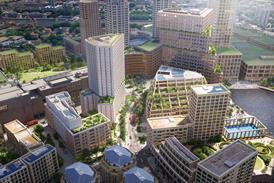- Home
 City of London to appoint architect to design firearms training facility for City police
City of London to appoint architect to design firearms training facility for City police Carmody Groarke gives preview of its revamped Manchester museum ahead of summer reopening
Carmody Groarke gives preview of its revamped Manchester museum ahead of summer reopening TP Bennett’s rethink on Canada Water scheme set to be approved next week
TP Bennett’s rethink on Canada Water scheme set to be approved next week What’s stopping us from better understanding our emissions?
What’s stopping us from better understanding our emissions?
- Intelligence for Architects
- Subscribe
- Jobs
- Events

2025 events calendar Explore now 
Keep up to date
Find out more
- Programmes
- CPD
- More from navigation items
Neo Bankside residents lose Tate Modern challenge

Court of Appeal refuses to overturn High Court nuisance and privacy decision on Herzog & de Meuron viewing gallery
Residents of RSHP’s Neo Bankside flats in Southwark have lost their latest attempt to stop visitors to the Tate Modern gallery “snooping” into their homes from the viewing area of its 10th floor extension.
The Court of Appeal this week rejected their challenge to last year’s High Court ruling that the Herzog & de Meuron-designed viewing gallery did not constitute a nuisance or an affornt to the privacy of residents in the high-end apartments, which have floor-to-ceiling windows.
The residents had complained that Tate Modern visitors looked into their homes with binoculars and took pictures of them, sometimes posting the images on social media. They wanted the Tate Board of Trustees to either close off part of the viewing area, or screen it to give greater privacy and claimed last year’s ruling had been wrong.
…
This content is available to registered users | Already registered?Login here
You are not currently logged in.
To continue reading this story, sign up for free guest access
Existing Subscriber? LOGIN
REGISTER for free access on selected stories and sign up for email alerts. You get:
- Up to the minute architecture news from around the UK
- Breaking, daily and weekly e-newsletters
Subscribe to Building Design and you will benefit from:

- Unlimited news
- Reviews of the latest buildings from all corners of the world
- Technical studies
- Full access to all our online archives
- PLUS you will receive a digital copy of WA100 worth over £45
Subscribe now for unlimited access.


